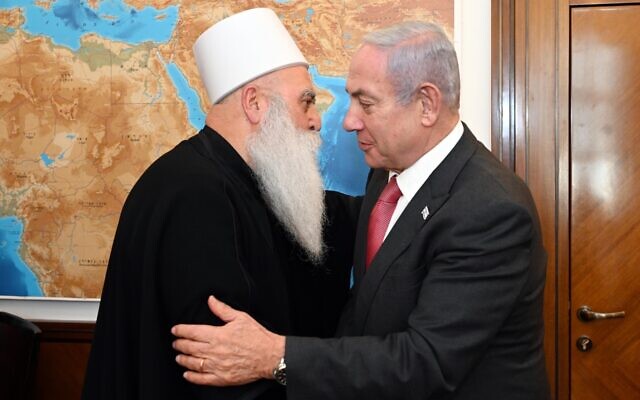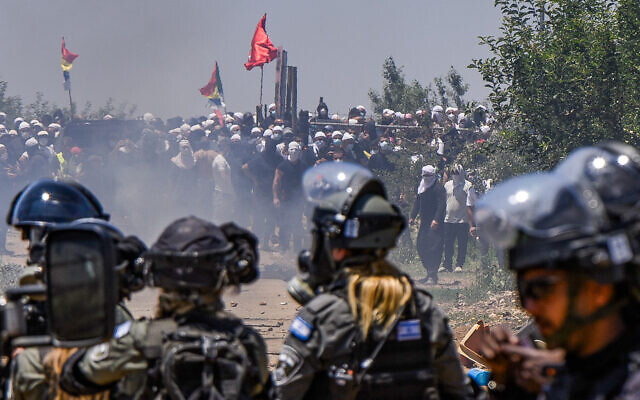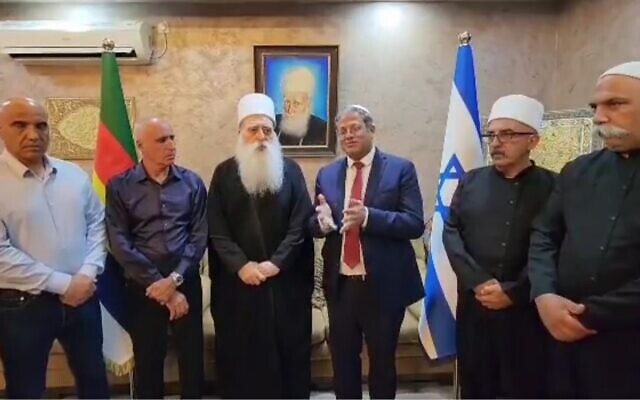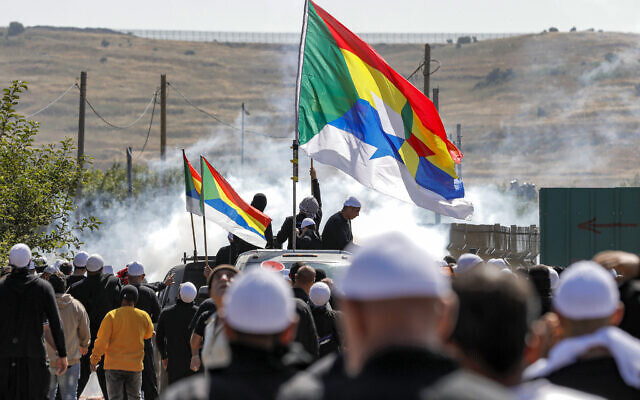Netanyahu announces brief pause to wind turbine construction in Golan Heights
PM says project on hold until after Eid al-Adha holiday on Wednesday; follows Druze leader’s warning against a community reaction that ‘the country has hitherto not seen’

Prime Minister Benjamin Netanyahu’s office on Saturday announced a brief, temporary pause to construction on a wind turbine project in the Golan Heights that sparked large protests by members of the Druze community this week.
A statement from the premier’s office said that Netanyahu spoke with Sheikh Muafak Tarif, the leader of the Israeli Druze community, and told him that construction will halt until after the Eid al-Adha holiday on Wednesday.
The announcement came a day after Tarif warned the government to stop the work on the wind turbines near the town of Majdal Shams or face “a reaction the country has hitherto not seen” and called on the prime minister to seek an arrangement that would be acceptable to Druze residents.
Tarif spoke at an emergency meeting in Kfar Yasif to approximately 2,000 people about the events this past week, according to Haaretz. He also urged Israel’s leaders to annul laws that discriminate against the Druze, which he said included the controversial 2018 nation-state law, which defined Israel as the nation of the Jewish people; and the so-called Kaminitz Law of 2017, which imposed high penalties on illegal construction and which minorities say has been used to disproportionately target them.
In the statement, Netanyahu’s office urged for solutions to the Druze community’s housing issues, particularly for those who served in the military.
In a meeting with Druze leaders Friday that had been previously scheduled, IDF chief of staff Herzi Halevi said the military wants “equality and partnership,” noting that the community “has made an exceptional contribution to national security through service in the IDF.”

“Even in difficult times, we must act according to the law and seek good solutions.”
On Thursday, National Security Minister Itamar Ben Gvir said work on the wind farm project would pause during the Eid al-Adha holiday next week, following the mass protests, but would resume right after.
Ben Gvir had previously taken a hardline approach to the Druze protests against the wind farm.
“The project will continue as usual. Governance is important to all of us. The State of Israel will not bow down to those who throw Molotov cocktails,” Ben Gvir said on Twitter, after meeting with Tarif and a Druze community council.
In an accompanying video posted by Ben Gvir, Tarif said, “The Druze community is against violence, we condemn violence.”
“We all agree on this,” Tarif said, adding that the community plans to hold further talks about the project with government officials.
“I really hope that during these holy days, we will reach agreements,” he said.

The mass protests against the wind farms devolved into riots on Tuesday and Wednesday, with Druze demonstrators burning tires and hurling rocks, fireworks and Molotov cocktails at massive police forces securing the area. Twelve police officers were wounded, and eight demonstrators were injured — four of them seriously, including one from gunfire.
Police said they had escalated into masses of people blocking roads and trying to storm the police position in the town of Mas’ade, and some using live fire.
The protests were held in several locations.
Earlier Thursday, Ben Gvir reportedly overruled Israel Police Commissioner Kobi Shabtai, who wanted to freeze the project. Construction had continued on Thursday despite the upheaval the day before.
According to a number of reports, police initially ordered the work on the wind turbines be stopped in the wake of the protests, before reversing that decision and allowing the work to continue. The Israel Police issued a statement denying the reports, saying that such a decision lay solely with the political establishment.
Netanyahu’s statement said the decision to freeze construction temporarily came at the advice of Shabtai and Shin Bet head Ronen Bar.
With the wind turbine project, Israel has sought to veer its energy production increasingly toward clean methods, with wind power a critical component of those plans. The Energy Ministry has said in the past that the Golan Heights, with its high altitude and windswept valleys, is an optimal location for wind farms.

Landowners who signed lease agreements with Energix, the company behind the project, say they weren’t made aware of the potential implications of having turbines on their plot. They say they were tempted by hefty sums into signing what they describe as draconian leases that, coupled with a boycott on the company imposed by influential religious leaders, have made many want to withdraw.
Israel captured the Golan Heights from Syria in the 1967 Six-Day War and annexed the territory in 1981 — a move that was not internationally recognized until the administration of former US president Donald Trump in 2019.
The Golan’s 26,000 Druze belong to an offshoot of Islam, speak Hebrew, and hold Israeli residency status that gives them the right to travel and work freely. The area is also home to some 22,000 Israeli Jews, and is a popular destination for domestic tourists.
But most of the Golan’s Druze residents have chosen not to take Israeli citizenship — meaning they do not vote in national elections and therefore have no elected representatives in the Knesset — and many still feel inextricably linked to Syria, though that has slowly been changing with more and more quietly applying for citizenship.
Druze from other parts of Israel fully participate in civic life and are renowned for their contributions to the country’s military and security forces.
The Associated Press contributed to this report.









